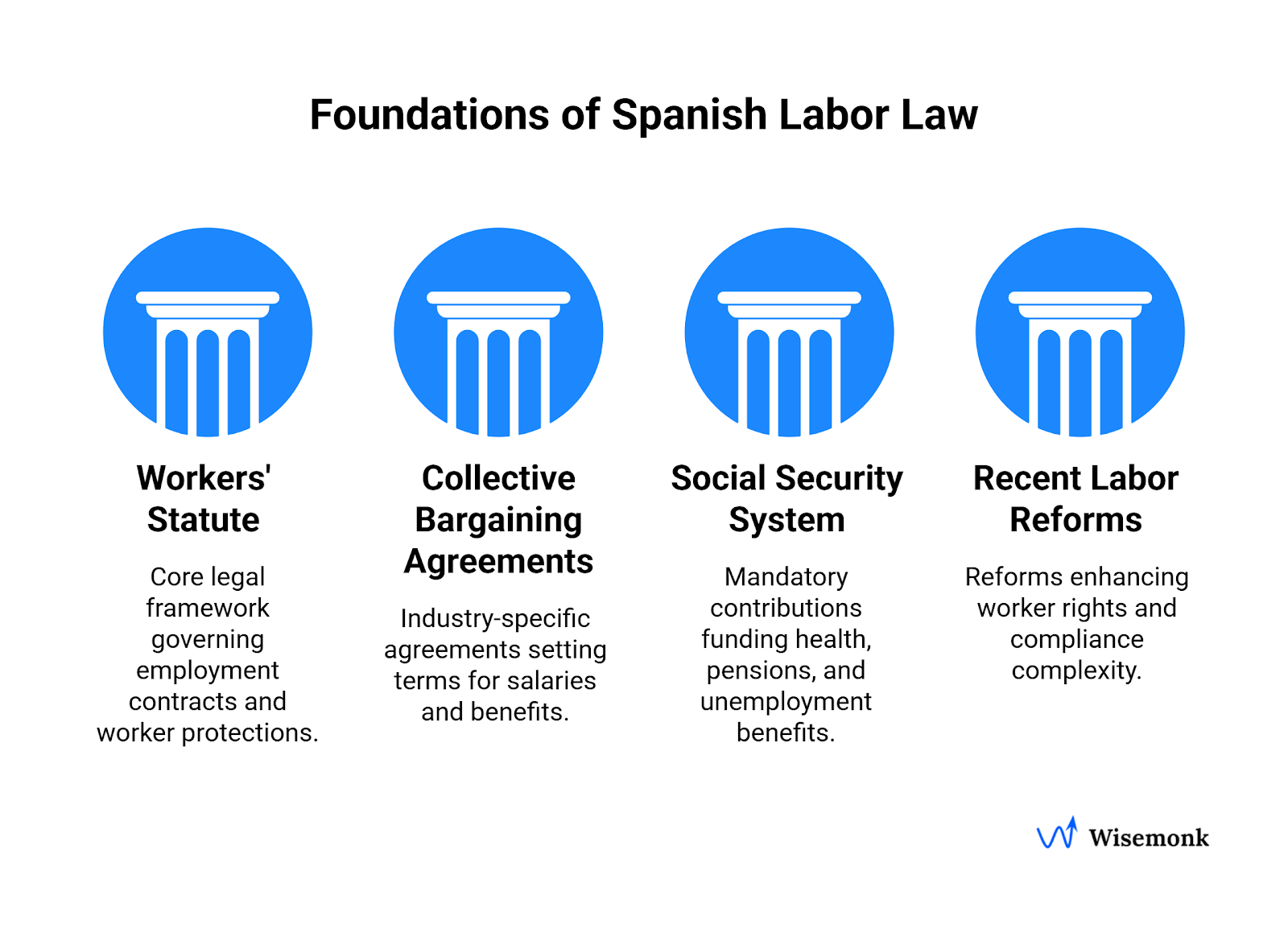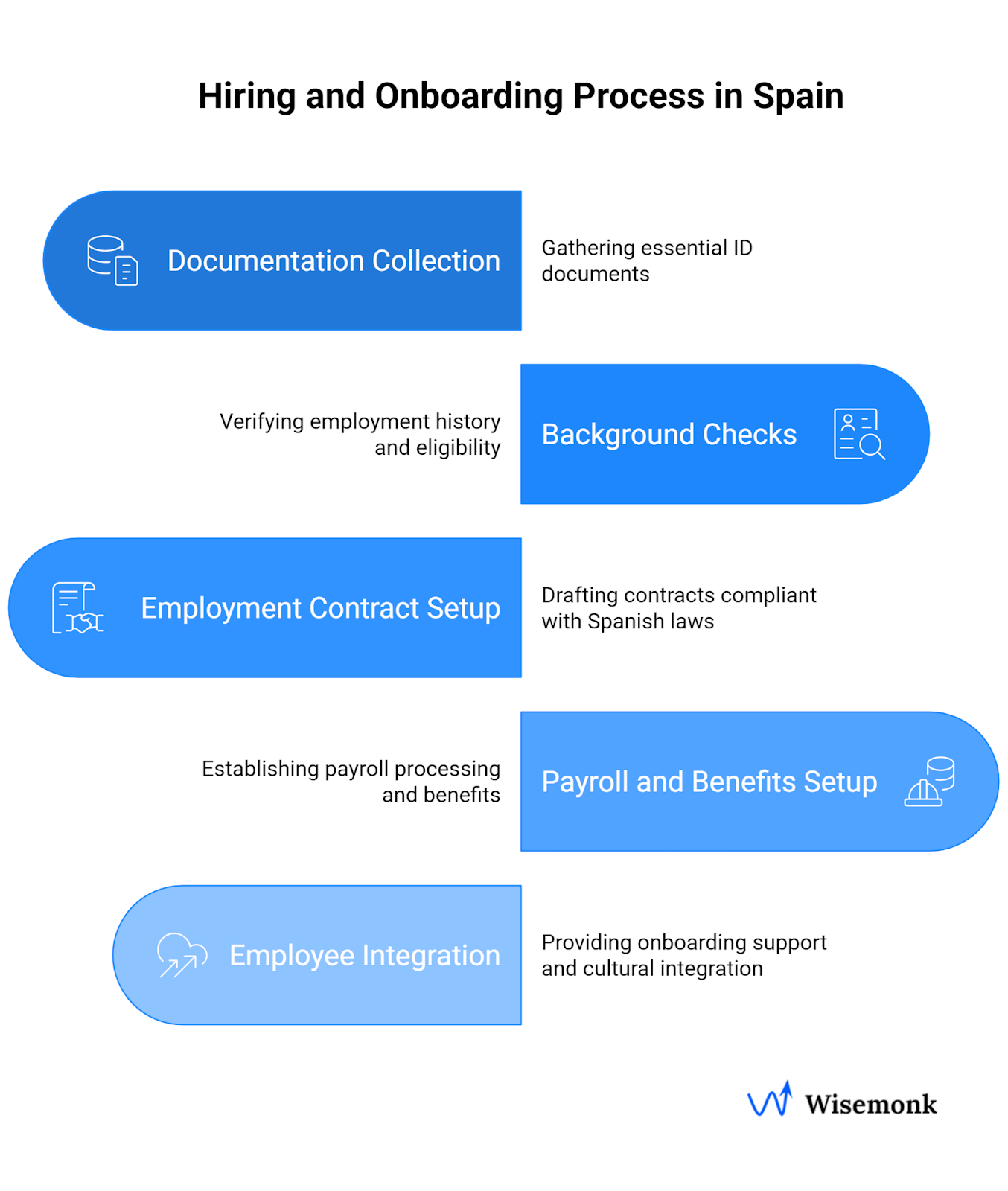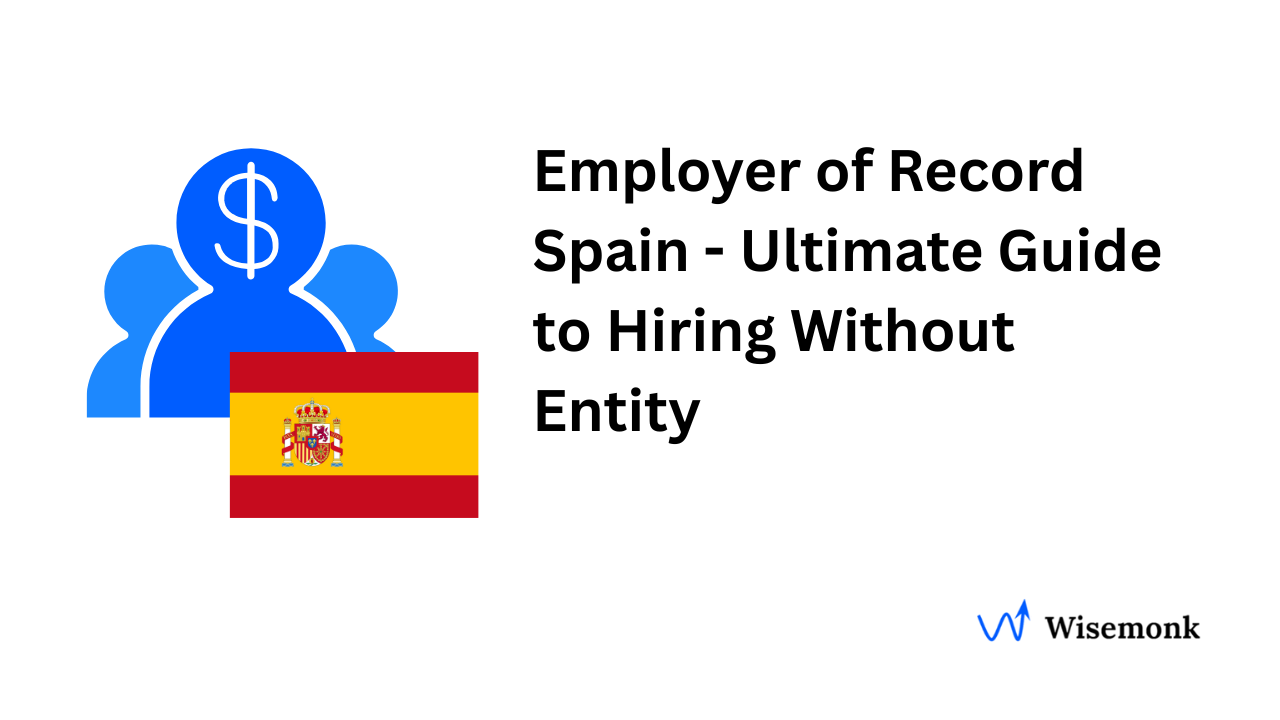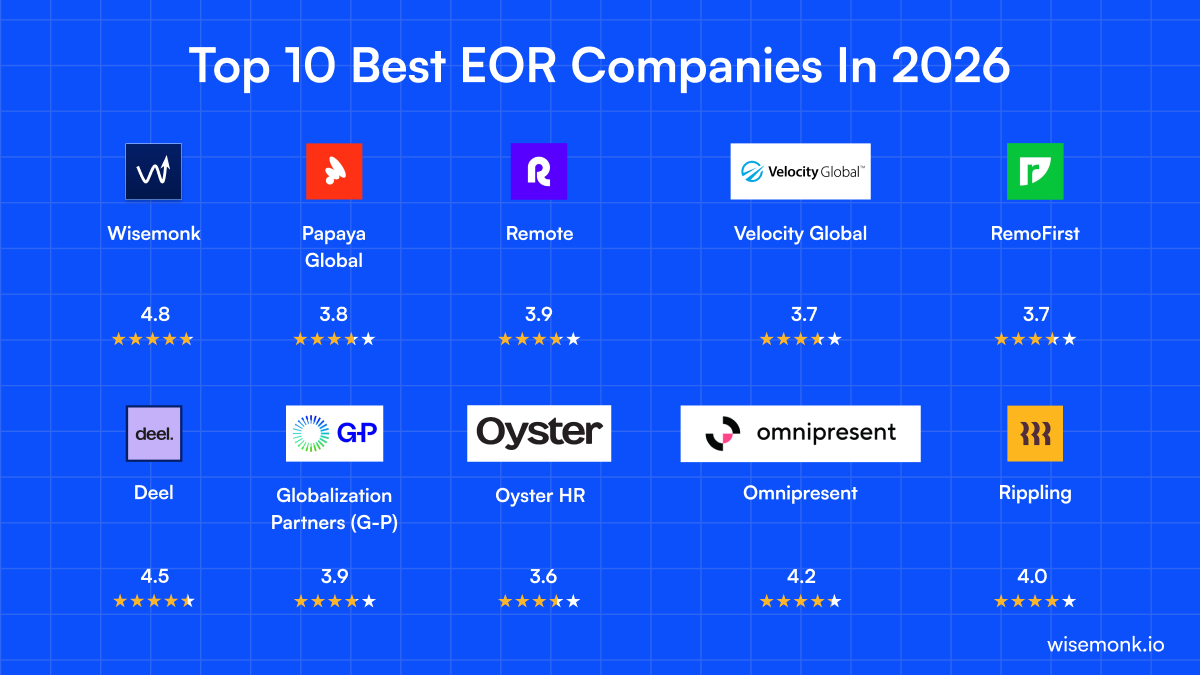Want to expand your team in the European Union with less hassle? Spain is a top pick for building your European team with less hassle, thanks to its strong economy, strategic EU location, and a wealth of highly skilled professionals. But complex Spanish employment law, social security contributions, and regional tax rules can trip up foreign companies looking to hire employees compliantly. That’s why partnering with an Employer of Record Spain (EOR) is essential; it streamlines payroll, compliance, and work permits, letting you enter Spain smoothly without creating a local legal entity.
What Are the Foundations of Spanish Labor Law?[toc=Spanish Labor Law Framework]
Navigating labor law in Spain requires clarity and expertise. Here’s what every employer must understand:

- Workers' Statute (Estatuto de los Trabajadores): This is Spain’s core legal framework, governing employment contracts, working conditions, paid leave, and severance pay protections (Spanish government source).
- Collective Bargaining Agreements: These collective labor agreements (CBAs) set industry-specific terms on salaries, hours, and benefits for most Spanish employees, ensuring legal compliance with labor agreements.
- Spanish Social Security System: Mandatory social security contributions from employers and employees fund health, pensions, unemployment, and disability benefits, regulated by the Employee Insurance Agency (Seguridad Social).
- Recent Labor Reforms: Reforms curtail temporary work abuse, increase minimum wages, and introduce digital time tracking, all reinforcing worker rights and adding compliance complexity (Spanish labor ministry).
Knowing these pillars helps companies establish compliant employment relationships and contracts aligned with Spanish laws.
What are the Key Benefits of Partnering with an Employer of Record in Spain?[toc=Key Benefits of EOR]
Setting up a local legal entity in Spain involves time-consuming registration, tax, and labor compliance. That’s where Employer of Record services shine. An employer of record in Spain acts as the official legal employer for your team, handling all employment contracts, payroll, social security contributions, and tax filings. This means:
- Simple Market Entry: You can start hiring and paying employees in weeks, without the administrative overhead of entity formation.
- Regulatory Compliance: The EOR ensures all contracts and processes comply with Spanish labor laws and collective bargaining agreements.
- Access to Talent: Tap into Spain’s rich skilled workforce, hiring both locals and international employees under one compliant framework.
- EU Expansion Gateway: Having a compliant record in Spain positions your business to grow further across the European Union.
Partnering with the right EOR provider lets your client company focus on core business while leaving the tricky employment regulations to trusted experts.
How Does Payroll and Tax Compliance Work in Spain with an EOR?[toc=Payroll & Tax Compliance]
Managing payroll in Spain is complex due to overlapping tax and social security requirements. Our experience shows that trusted Employer of Records can help you with:
- Full management of payroll taxes and contribution filings with the Spanish tax authorities (Agencia Tributaria) and social security institution.
- Accurate calculation and deduction of employee and employer contributions to the Spanish social security system, including unemployment, disability, and health insurance.
- Handling monthly reporting and annual filings to ensure timely compliance.
- Assistance with the 30% ruling, a valuable tax incentive for highly skilled expatriates, coordinated directly with tax authorities to maximize employee benefits (Dutch tax agency).
This meticulous approach reduces risk and ensures your teams are paid correctly and legally.
What Employee Benefits Are Mandatory Under Spanish Law?[toc=Employee Benefits]
To comply with Spanish law and attract top talent, you must provide key employee benefits. Spanish employees are entitled to:
- Paid annual leave: At least 30 calendar days per year, plus paid national and regional holidays.
- Extra payments (pagas extras): Typically, employees receive 14 monthly payments per year instead of 12, including bonuses usually paid in June and December.
- Maternity and paternity leave: Generous government-backed leave entitlements supporting families.
- Sick leave: Employers must pay a significant portion of salary during sick leave, supported by social security benefits.
- Health insurance: While basic coverage is provided by the social security system, employers often offer additional private cover as part of attractive benefits packages.
- Pension obligations: Contributions to Spain’s pension system are required, shared between employer and employee, ensuring long-term financial security.
An EOR ensures benefits administration aligns with statutory rights and collective agreements.
What Does the Hiring and Onboarding Process Look Like with an Employer of Record Spain?[toc=Hiring & Onboarding Process]
From our experience facilitating global employee onboarding, the process with an Employer Of Record breaks down into clear, manageable stages:

- Step 1: Documentation Collection
Gather essential ID documents including the NIE (tax identification number), social security registration, valid work permits for non-EU nationals, and local bank account details. - Step 2: Background Checks
Conduct verification of employment history, qualifications, and legal eligibility to work in Spain. - Step 3: Employment Contract Setup
Draft contracts compliant with Spanish employment laws and collective bargaining agreements, detailing salary, benefits, probationary period, and termination rights. - Step 4: Payroll and Benefits Setup
Establish payroll processing including salary payments, tax and social security withholdings, and benefits administration. - Step 5: Employee Integration
Provide formal onboarding support, ensuring employees understand their rights, benefits, and company culture.
Typically, onboarding via Spain EOR takes 2–4 weeks, enabling rapid, compliant workforce deployment.
How Can You Effectively Manage Your Spanish Workforce?[toc=Workforce Management]
From extensive research and industry insights that effective workforce management in Spain relies heavily on understanding local culture and labor expectations.
- Spain’s workplace culture values respect, open communication, and collaboration.
- Transparent two-way communication and regular performance feedback are expected.
- Professional development and opportunities for growth foster employee loyalty.
- Spanish employees prioritize work-life balance, with strict adherence to holiday and leave laws.
Employers respecting these norms build engaged, productive teams with lasting retention.
What Are the Termination Rules and Risks in Spain?[toc=Termination & Dismissal Procedures]
Termination procedures in Spain are known to be strict and complex, so getting expert guidance is essential to navigate them smoothly and avoid potential mistakes.
- Dismissals require valid justification and may be categorized as disciplinary, objective (economic or technical), or collective.
- For objective dismissals, written notice periods (usually 15 days) and proper documentation are mandatory.
- Severance pay ranges around 20–33 days’ salary per year of service, depending on contract specifics.
- Certain dismissals require prior authorization from the Employee Insurance Agency (SEPE/UW)
- Failure to comply can lead to costly legal disputes and damage to your company’s reputation.
An EOR proactively manages these legal obligations, shielding you from risk.
What Are the Costs and ROI of Using an Employer of Record in Spain?[toc=Costs & ROI]
Based on our extensive research and Employer of Record expertise, choosing Employer Of Record services in Spain speeds up market entry, cuts costs, reduces administrative burdens, and ensures full compliance with local labor and tax laws. It also lowers legal risks and offers greater flexibility to scale your workforce quickly.
Here’s a clear comparison between using an employer of record Spain and setting up your own local legal entity:
Choosing an EOR provides predictable costs, minimizes legal risk, and lets you focus on growth rather than paperwork.
What Are Common Challenges with Employer of Record Spain and How Can You Overcome Them?[toc=Challenges]
When expanding your team in Spain with an employer of record, it’s important to anticipate common challenges and know how to handle them effectively. Here are the key issues you may face and how an EOR can help:
- Navigating dismissal procedures: Spanish law requires precise documentation and sometimes governmental approval for layoffs; Employer of Records provides expert legal support to avoid costly mistakes.
- Managing regional payroll and taxes: Taxes and social security contributions vary by autonomous region; EORs ensure accurate, compliant filings with the Spanish tax authorities everywhere you operate.
- Cultural integration: Spanish work culture values open communication and work-life balance; EORs assist with onboarding and ongoing HR support to foster employee engagement.
- Scaling compliantly: Rapid growth across Spain and the EU brings complexities; EORs offer flexible, compliant scalability while handling local labor laws and payroll management.
By partnering with an employer of record in Spain, you gain trusted guidance to overcome these challenges while focusing on your business growth.
Conclusion: Strategic Next Steps for Expanding to Spain with an EOR[toc=Conclusion]
Based on our extensive experience supporting global employers, the proven path to successful expansion in Spain is through a compliant, expert employer of record Spain partner. Ensure your employment contracts adhere to the appropriate collective bargaining agreements, respect works council requirements, and follow Spanish social security and tax laws thoroughly. With a professional EOR managing your payroll, benefits administration, and legal compliance, your business gains speed, flexibility, and peace of mind as you grow in the Spanish market and across the European Union.
Ready to expand your global business quickly and compliantly? Partner with Wisemonk’s Employer of Record services to effortlessly manage hiring, payroll, and compliance, so you can focus on growing your business with confidence.
Frequently asked questions
What are the extra payments (pagas extras) in Spain?
Pagas extras are legally mandated additional salary payments, typically two per year, often paid in June and December (Spanish labor ministry).
How does the Spanish social security system work?
Employers and employees jointly fund the social security system, covering healthcare, pensions, unemployment, and disability (Seguridad Social).
What are the dismissal procedures and costs?
Dismissals require prior notice, justification, and often severance pay. Certain types require authorization from the government’s labor authorities (SEPE).
How long does it take to hire through EOR in Spain?
Typically between 2 to 4 weeks for onboarding, social security registration, and payroll setup.
What are regional tax implications in Spain?
Tax and holiday entitlements vary by autonomous communities, so compliance involves detailed regional knowledge.
Is an Employer of Record illegal in Spain?
No, using an Employer of Record (EOR) in Spain is legal. EORs are recognized for handling payroll, contracts, taxes, and compliance while allowing companies to hire employees without setting up a local entity.
What is the Employer of Record liability?
An Employer of Record (EOR) is the legal employer of the worker and is responsible for employment-related liabilities, including discrimination, harassment, and other legal claims arising from the employee’s actions.

.png)
%20(1).webp)
